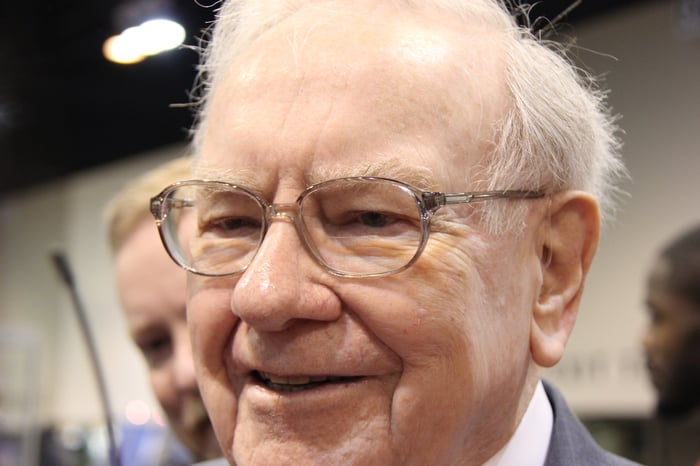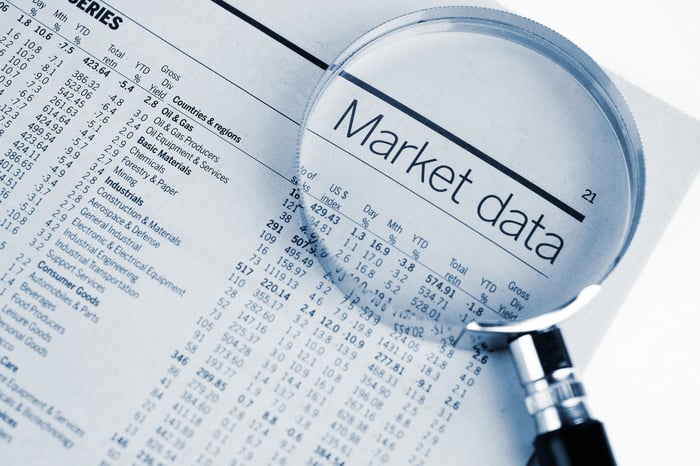For nearly six decades, Berkshire Hathaway (BRK.A 1.18%) (BRK.B 1.30%) CEO Warren Buffett has made making money on Wall Street look easy. Although the Oracle of Omaha isn't infallible, he's overseen a jaw-dropping 20.1% average annual return on his company's Class A shares (BRK.A) since taking the reins in 1965. For those who are curious, this works out to an aggregate return of more than 3,600,000% through the end of 2021.
Because of Warren Buffett's resounding success over the years, retail and professional investors alike have been known to ride his coattails to big gains. They do this by closely monitoring Berkshire Hathaway's 13F filings.

Berkshire Hathaway CEO Warren Buffett. Image source: The Motley Fool.
Berkshire Hathaway's 13Fs don't always tell the full story
A 13F is akin to looking under the hood of a high-powered automobile. It's a required filing with the Securities and Exchange Commission (SEC) for money managers with at least $100 million in assets under management and allows investors to see what securities successful fund managers were buying, selling, and holding during the most-recent quarter. A 13F is often the golden ticket to mirroring Buffett's investment activity.
But as we've seen, not everything Warren Buffett owns or buys is necessarily going to show up in a 13F filing with the SEC. For example, the Oracle of Omaha and his right-hand man Charlie Munger have repurchased more than $62 billion of Berkshire Hathaway's Class A and B shares since July 2018. That's far more than this dynamic duo has spent on any single stock in Berkshire's investment portfolio over the past four years -- and you won't find this buying activity listed in a 13F filing.
Likewise, Warren Buffett has a secret portfolio with $6.31 billion in assets under management, as of the end of March. When Berkshire Hathaway acquired insurer General Re in 1998 for $22 billion, it also bought specialty investment company and General Re subsidiary New England Asset Management (NEAM).
Even though Buffett isn't in control of NEAM's investment portfolio, Berkshire Hathaway is ultimately the owner of any securities it buys. You can find New England Asset Management's holdings in its quarterly 13F, but you won't find these holdings listed in Berkshire's quarterly 13F filing.
Surprise! Warren Buffett (sort of) owns all the FAANG stocks
Perhaps the biggest surprise of all is that Warren Buffett, an investor who's generally shunned technology stocks and high-growth companies throughout his 57-plus years at the helm, has a stake, either directly or indirectly, in all five FAANG stocks.
When I say "FAANG," I'm talking about:
- Facebook, which has changed its name to Meta Platforms (META -4.13%)
- Apple (AAPL -1.22%)
- Amazon (AMZN -2.56%)
- Netflix (NFLX -9.09%)
- Google, which changed its name to Alphabet (GOOGL -1.23%) (GOOG -1.10%)
A few of the FAANGs have been fixtures in Buffett's portfolio for years. Apple is Berkshire's largest holding by market value, accounting for 42.5% of the company's $354 billion of invested assets, as of last weekend. The Oracle of Omaha refers to Apple as one of his company's "four giants," so it's unlikely this position will be reduced anytime soon.
Meanwhile, e-commerce giant Amazon has been a continuous holding for more than three years. Buffett has previously stated that Berkshire's position in Amazon was initiated by one of his investing lieutenants, Todd Combs or Ted Weschler. Both Apple and Amazon have been showing up in Berkshire Hathaway's quarterly 13Fs.
But what about social media stock Meta Platforms, streaming-platform Netflix, and internet-search behemoth Alphabet (the parent of Google)? For these stocks, we have to go further down the rabbit hole to one of Berkshire Hathaway's first-quarter buys.
Among the 16 stocks Warren Buffett and his investing team added since the year began is diversified holding-company Markel (MKL 1.43%). This company is often viewed by the investing community as a mini-Berkshire, with nearly $7 billion in assets under management, as of June 30, 2022.
Buffett is a shareholder in Markel, as his company, technically, has a vested interest in the more than 100 securities in which Markel is invested. This includes 43,000 shares of Netflix, more than 184,000 shares of Meta, and close to 2.75 million shares of Google (Class C, GOOG).
Indirectly, at least, Warren Buffett "owns" all five FAANG stocks.

Image source: Getty Images.
The FAANG stocks check all the appropriate boxes for Buffett
Even though the Oracle of Omaha only owns two of the five FAANGs directly, they all possess the characteristics Buffett would look for in a long-term investment. For instance, each of the FAANG stocks are industry leaders that have operating models capable of running on autopilot:
- Meta had more than half the world's adult population (3.65 billion people) visit its owned social media assets on a monthly basis during the second quarter.
- Apple has controlled 50% or more of U.S. smartphone market share in all but one quarter since releasing a 5G-capable iPhone.
- Amazon is forecast by eMarketer to account for just shy of 40% of all U.S. online retail sales in 2022. That's more than its 14 closest competitors on a combined basis.
- Netflix accounted for a whopping 45.2% of global-streaming market share, as of the first quarter of 2022, according to Parrot Analytics.
- Alphabet's internet-search engine Google is a veritable monopoly. Over the past 24 months, it's controlled between 91% and 93% of global internet-search share.
These are also well-recognized brands that have relatively loyal customer bases. Amazon has pivoted its strong customer engagement into more than 200 million global Prime memberships, which add tens of billions in annual revenue for the company. Meanwhile, Apple is leaning on its loyal customers as it transitions to a subscription service-driven operating model.
Warren Buffett will also appreciate the capital-return programs for these companies. Apple has repurchased approximately $520 billion worth of its own stock since initiating a buyback program in 2013. As for Alphabet, it's spent around $140 billion on share repurchases over the past five years (through June 30, 2022). A hearty dividend and/or buyback program is an easy way to get Warren Buffett's attention and stay on his good side.
Even the management teams for all five FAANG stocks are arguably strong. There's been continuity at key leadership positions and, for the most part, long-term strategic visions are being met. In other words, the FAANG stocks check all the right boxes for Warren Buffett.




